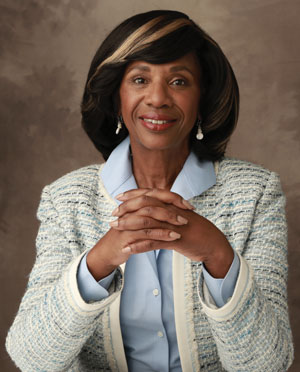Equal Justice for All: The time is now; the rule of law also applies to the poor

Photo of ABA President Paulette Brown by Marc Hauser.
“The opposite of poverty is not wealth. In too many places, the opposite of poverty is justice.”
This quote from Bryan Stevenson, founder of the Equal Justice Initiative and National Law Day chair, is especially relevant today. Across the country, the poor are denied access to justice and equal protections under the law, a troubling trend that threatens the rule of law in America.
One development threatening the concept of equal justice involves the growing crisis in public defender offices. Ground zero for this emergency is Louisiana. Already the state with the highest incarceration rate in America, almost 85 percent of defendants in Louisiana look to a public defender for representation.
But with funding dwindling, 33 of the 42 public defenders’ offices in the state have restricted their services. New Orleans public defenders are not accepting new cases and are being sued by the ACLU. A recent study by the National Association of Criminal Defense Lawyers found that public defenders in New Orleans have only seven minutes on average to prepare for each new case. This is clearly not enough time to organize a constitutionally adequate defense and results in far more plea deals that may be deemed questionable.
It all comes down to money. Louisiana, unlike any other state, receives most of its revenue from traffic tickets and court costs. This inconsistent form of revenue depends on drivers’ habits, enforcement efforts and even the location of state highways. This is no way to guarantee peoples’ Sixth Amendment rights. Adequate and consistent government funding is imperative.
Louisiana may have the direst situation now, but the crisis is nationwide. In the past decade, overloaded defenders’ offices in Florida, Missouri and Montana have stopped accepting clients as a way to get legislators’ attention, and it has worked. They have gotten more funding. This “Hail Mary” solution is not sustainable.
The U.S. Department of Justice and the American Bar Association national standards recommend that public defenders handle no more than 150 felony, 400 misdemeanor, 200 juvenile, 200 mental health, or 25 appeals per year. In Fresno County, California, public defenders handle up to 700 felony cases. In Chicago, Atlanta and Miami, defenders carry more than 2,000 misdemeanor cases per year, forcing them to resolve about 10 cases a day.
A 2011 study by the Justice Policy Institute found that 73 percent of county-based and 79 percent of state-based public defenders’ offices do not have enough lawyers to handle their caseloads. In seven states, all indigent-defense funding comes from counties, not the state. In many other states, defendants must pay a fee for, or even the full cost of, their public defender. This is not equal justice for all.
The right to counsel and an adequate defense is our constitutional right. The state must provide the resources to make criminal court proceedings fair for both sides, without regard to the financial situation of the defendant. In 1963, the U. S. Supreme Court unanimously ruled in Gideon v. Wainwright that indigent criminal defendants must be provided counsel by the state.
We must heed the words of President Theodore Roosevelt, who said, “No man is above the law and no man is below it.”
The ABA issued the Ten Principles of a Public Defense Delivery System in 2002, calling for defense counsel, among other things, to have reasonable caseloads, sufficient time and resources, expertise and training to carry on an effective defense. In 2009, the ABA approved the Eight Guidelines of Public Defense Related to Excessive Workloads. Yet, public defenders continue to carry twice the recommended felony caseloads and three times the recommended misdemeanor caseloads.
As Justice Hugo Black—the author of the Gideon decision—wrote in 1956, “There can be no equal justice where the kind of trial a man gets depends on the amount of money he has.”
If the rule of law does not apply to everyone, then it will end up applying to no one.
This article originally appeared in the June 2016 issue of the ABA Journal with this headline: “Equal Justice for All: The time is now. The rule of law also applies to the poor.”



